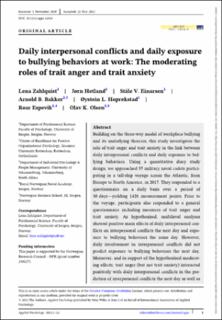Daily interpersonal conflicts and daily exposure to bullying behaviors at work: The moderating roles of trait anger and trait anxiety
Zahlquist, Lena Aadnevik; Hetland, Jørn; Einarsen, Ståle Valvatne; Bakker, Arnold B.; Hoprekstad, Øystein Løvik; Espevik, Roar; Olsen, Olav Kjellevold
Peer reviewed, Journal article
Published version

Permanent lenke
https://hdl.handle.net/11250/3038015Utgivelsesdato
2022Metadata
Vis full innførselSamlinger
- Artikler [251]
- Publikasjoner fra Cristin - FHS [182]
Sammendrag
Building on the three-way model of workplace bullying and its underlying theories, this study investigates the role of trait anger and trait anxiety in the link between daily interpersonal conflicts and daily exposure to bullying behaviors. Using a quantitative diary study design, we approached 57 military naval cadets participating in a tall-ship voyage across the Atlantic, from Europe to North America, in 2017. They responded to a questionnaire on a daily basis over a period of 30 days—yielding 1428 measurement points. Prior to the voyage, participants also responded to a general questionnaire including measures of trait anger and trait anxiety. As hypothesized, multilevel analyses showed positive main effects of daily interpersonal conflicts on interpersonal conflicts the next day and exposure to bullying behaviors the same day. However, daily involvement in interpersonal conflicts did not predict exposure to bullying behaviors the next day. Moreover, and in support of the hypothesized moderating effects, trait anger (but not trait anxiety) interacted positively with daily interpersonal conflicts in the prediction of interpersonal conflicts the next day as well as exposure to bullying behaviors the same day. The study suggests that interpersonal conflicts persist and have an immediate effect on exposure to bullying behaviors and that this is particularly the case for individuals high (vs. low) on trait anger. We discuss how these findings contribute to the three-way model of workplace bullying, as well as possible practical implications.